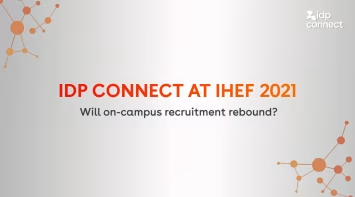The COVID-19 pandemic’s long-term impact on the higher education sector will be profound in a variety of ways. What and where students choose to study in the future is likely to be significantly impacted by the pandemic, as is how they approach their higher education decision making. Our IQ data already shows that over the last year nursing and subjects linked to mental health have seen dramatic increases. Looking at demand data on Whatuni, a dataset of over six million annual unique users, we’ve also seen that prospective students have slightly higher aspirations, as searches for Russell Group universities have increased.
Across the UK, we’ve seen increases in searches from cities beyond London, promisingly suggesting wider geographic participation in higher education, and we’ve also seen increases in time spent researching online. In this article, we’ll unpack some of these trends in more detail to help institutions prepare for a Clearing season unlike any other.
Courses in focus
For the purposes of our analysis, we compared year-on-year user search trends on Whatuni, looking at February and March 2020 versus 2021. This selected period came after the January UCAS deadline, which means that users were more likely to be researching their Clearing 2021 options than their first-choice applications.
The data shows that there has been a 4% increase in Course Details pageviews and a corresponding 4% decline in Institution Profiles pageviews. This could suggest that prospective students are prioritising researching and comparing different course options over making decisions based on the institution to a greater extent this year. The lack of on-campus open days throughout the pandemic means that prospective students are more reliant on online resources than ever before. Institutions can capitalise on this by emphasising their course-related marketing messaging.

Institutions are presented with a unique opportunity to showcase the best of their courses and raise their profiles online to a captive audience of users actively researching their study choices.

Year of Entry
During February and March 2021, 48.2% of users on Whatuni were researching options for commencing their studies this coming September: a 3% drop compared to last year. It’s notable, however, that due to overall traffic on Whatuni being higher this year, overall volume for September 2021 entry data is similar to what it was last year. Given the expectations that grades will be more generously awarded this year, leading to more students getting their first choice, it is perhaps surprising that so many students are continuing to research 2021 courses and considering their Clearing options. This could be a sign that high numbers of prospective students are considering how they might change course should their grades be significantly higher than expected, rather than simply researching back-up options.
Searches for future years (excluding September 2022 entry) saw a marked increase of 8.7% in share. This suggests that institutions can not only proactively engage with and promote their USPs and courses to prospective students for Clearing 2021, but also build brand awareness and make a positive impression on future prospective student cohorts actively researching their higher education options.
Subjects and content trends
Of the top 10 sub-disciplines collectively searched on Whatuni and the Complete University Guide, Computer Science saw the largest YoY rise of overall percentage share at 17.3%, followed by Nursing at 15.1% and Semi-medical/ Physical/ Psycho/ Therapies at 14.1%.
The data suggests that prospective students are seeking out high-demand professions such as Computer Science, perhaps a response to the increasing digitalisation of the world and the growing importance of technology. Read more about the rise of Computer Sciences in this recent blog post.
These trends may also be an indication that students are drawn to subjects centred around mental and physical health, particularly given the mental health crisis brought about by the pandemic and the employment opportunities linked to it. Read more about how mental health nursing is driving demand for nursing as a sub-discipline in this blog post. Nursing as a sub-discipline has particularly benefited from the government’s reintroduction of a nursing bursary, but also potentially because nurses have been hailed as heroes in their handling of the pandemic.
The sub-disciplines in the top 10 that have taken the biggest knocks are harder to get into, which makes them unlikely candidates for entry via Clearing. Economics saw a -14.1% YoY decline in searches, followed Financial Management/ Accounting at -7.6%.
Institutions will do well to take stock of the subjects most searched by prospective students and to tailor marketing campaigns leading up to and throughout Clearing based on these areas of interest, particularly seeing that prospective students are placing greater emphasis this year on course searches.

The articles featured on Whatuni over the last year that grabbed the most attention have centred around the COVID-19 pandemic. After the topmost searched article (8 Jobs you can do with a criminology degree), the second most searched article was titled: Coronavirus: How A-Level grades will be awarded in 2021. The third-most searched article focused on whether BTECs are as valuable as A-levels, perhaps suggesting a trend towards more practical career outcomes or an indication that students who took this A-level alternative may be considering higher education in greater numbers this year. And finally, the fourth most searched article centred around how COVID-19 has impacted university applications and entry.
COVID-19 is top of mind for researching prospective students looking to apply to courses via Clearing. Institutions should be as transparent as possible in how current and prospective students are being supported and how applications may be affected during Clearing. Frequent and reassuring communications around these themes are essential for building trust with prospective students.
Demand trends
The pandemic is likely to have impacted where demand for higher education is coming from around the UK. While demand across the UK has increased this year, London saw a smaller increase than other parts of the UK, thereby decreasing its percentage share of users by 4%. Other cities have increased their percentage share, albeit by marginal amounts. This may suggest that prospective student markets are slightly more geographically disperse this year compared to last. As institutions prepare for Clearing, it’s worth bearing in mind the geographic diversity of student targets markets and how this may call for more nuanced messaging.
Another factor that seems to be impacting on student demand trends is this year’s prospect of teacher-led assessment. Our data shows that prospective students seem to have slightly higher aspirations with Russell Group institutions rising in searches from 13.42% in 2020 to 16.49% in 2021. This may suggest that students associate teacher assessments with slightly higher grades. While the vast majority of users (83.51%) are still researching non-Russell Group institutions, there is more competition this year with Russell Group institutions, which makes it even more important for institutions to focus on applicant retention and building positive brand awareness.

When we look at the grades that users enter on Whatuni when they do their university research, we can see that while searches for the top 168 UCAS tariff points (A*A*A* grade) are lower this year, there has been a rise in users entering 160, 152 and 144 UCAS grade tariffs. These tiers represent A*A*A, A*AA and AAA, which means that students hoping to enter higher education through Clearing may indeed be expecting higher grades and therefore are likely to be seeking courses and institutions with higher entry requirements and reputations. With higher grades, students are likely to have more options to choose from, which means that institutions will need to prepare for a much more competitive playing field this year.

Maximising student engagement
With many more prospective students solely relying on online channels for their university research, higher grade expectations and more competition, institutions should prioritise applicant retention and raising their profiles ahead of Results Day to attract applicants during Clearing.
On A-level Results Day 2020, our two dedicated Clearing channels - Whatuni and the Complete University Guide - attracted 155,000 users. This year, institutions have the opportunity to promote courses available through Clearing via these two market-leading websites to a segmented audience of actively researching prospective students.
Sign up for Clearing Core partnership
Our all-inclusive VIP package, Core partnership gives your institution the opportunity to feature across our entire Clearing network with guaranteed delivery of highly qualified clicks and calls. Your courses will be featured in all clearing-course searches and your immersive content, including video, will be featured at key touchpoints on site and across social media. You will receive quality web clicks and calls and you’ll be able to track ROI with our guaranteed delivery scheme. If you’d like to find out more about our Clearing packages, please get in touch with our client partnership team: ukclientpartnerships@idp-connect.co.uk
You might like...

Top 5 ways universities can maximise their impact leading up to A-level results day
Effective strategies your institution can use to attract more students on A-level results day

Increasing demand for Clearing and what it means for students and institutions: analysing A-level results day 2022
A roundup of A-level results day 2022 Clearing trends

PRESS RELEASE: Despite record number of top grades, students fight for a spot through Clearing
With so many students achieving top grades, our data shows highly qualified students are turning to Clearing



